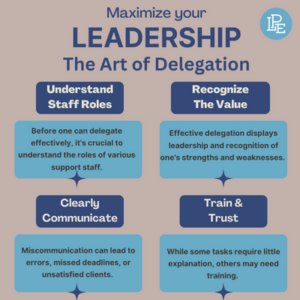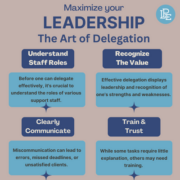

The transition from law school to the professional world can be jarring for many new attorneys. While legal education equips one with the knowledge of the law, the practical nuances of managing one’s work in a firm setting often require a different set of skills. One such skill is the art of delegation and appropriately using support staff. Harnessing this ability is essential for efficiency, client satisfaction, and overall firm productivity.
Understand the Role of Support Staff
Before one can delegate effectively, it’s crucial to understand the roles of various support staff:
- Paralegals: They are equipped to assist with legal research, drafting documents, and preparing materials for trial or other legal proceedings.
- Legal Assistants: Their tasks often involve administrative duties like scheduling, client communications, and file management.
- File Clerks: They manage and organize client files, ensuring that important documents are easily accessible.
- Receptionists: The front face of your firm, handling initial client interactions and directing calls.Recognize the Value of Delegation
Recognize the Value of Delegation
Delegating is not a sign of inability or incompetence. On the contrary, effective delegation displays leadership and recognition of one’s strengths and weaknesses. Delegating allows attorneys to:
- Prioritize critical tasks that require their expertise.
- Utilize the specialized skills of support staff.
- Enhance productivity by distributing tasks appropriately.
Clearly Communicate Tasks
Miscommunication can lead to errors, missed deadlines, or unsatisfied clients. When delegating:
- Be specific about what needs to be done.
- Set clear deadlines.
- Provide all necessary resources or information.
- Encourage questions to ensure clarity.
Train and Trust
While some tasks require little explanation, others may need training. Invest time in:
- Training your support staff on specific tasks or procedures.
- Providing constructive feedback.
- Building trust and rapport. Trust your team to handle their responsibilities, but also be available for guidance.
- Schedule quick daily meetings. This gives your staff the opportunity to ask questions without disrupting your work with multiple interruptions throughout the day.
Respect Their Time and Expertise
Support staff, just like attorneys, have their own set of tasks and deadlines. Before delegating:
- Check in with their current workload.
- Understand their areas of expertise and use them to the firm’s advantage.
- Respect their boundaries and off-work hours.
Foster an Open Feedback Environment
Encourage an environment where support staff feels comfortable providing feedback. They are often the ones who recognize procedural inefficiencies or have insights into improving workflows.
Avoid Micromanaging
Once you’ve delegated a task, avoid the temptation to oversee every little detail. Micromanaging can:
- Reduce morale and the confidence of support staff.
- Take away time you could be using to focus on other tasks.
- Impede the professional growth of your team.
Recognize and Appreciate
Everyone thrives on appreciation. Regularly recognizing the hard work and contributions of your support staff can:
- Boost morale.
- Encourage loyalty and dedication.
- Foster a positive and collaborative work environment.
Conclusion
The ability to effectively delegate and use support staff appropriately is an essential skill for new attorneys. It’s not only about reducing one’s own workload but about ensuring that every task is undertaken by the person most suited for it. With mutual respect, clear communication, and trust, attorneys and their support staff can ensure a harmonious and efficient work environment, delivering the best results for their clients.
 In an increasingly complex and competitive legal marketplace, law firms are recognizing the necessity for more business-oriented strategies. Gone are the days when reputations alone could guarantee a steady stream of clients. In today’s environment, strategic planning – the art and science of bridging a firm’s current operations with its future direction – has become critical. Here, a law firm management consultant emerges as a lighthouse guiding firms through uncharted territories. These professionals play an integral role in shaping a law firm’s strategic trajectory, ensuring not just survival, but prosperity. The right consultant will be able to provide the following:
In an increasingly complex and competitive legal marketplace, law firms are recognizing the necessity for more business-oriented strategies. Gone are the days when reputations alone could guarantee a steady stream of clients. In today’s environment, strategic planning – the art and science of bridging a firm’s current operations with its future direction – has become critical. Here, a law firm management consultant emerges as a lighthouse guiding firms through uncharted territories. These professionals play an integral role in shaping a law firm’s strategic trajectory, ensuring not just survival, but prosperity. The right consultant will be able to provide the following:
Understanding the Legal Landscape
A consultant specializing in law firm management comes equipped with a deep understanding of the legal industry’s nuances. They monitor trends, regulatory changes, emerging technologies, and competitive forces. By conducting comprehensive market analyses, consultants can identify both opportunities for growth and potential threats, serving as the foundation for informed strategic decision-making.
Objective Assessment of Current Practices
Often, law firms operate with an internal perspective, unaware of inefficiencies or outmoded practices eroding their competitiveness. The right consultant can provide an objective, third-party evaluation of current operations, from workflow efficiency, client relationship management, to profit margins. By highlighting areas needing improvement, they pave the way for transformative solutions.
Facilitating a Culture of Strategic Thinking
One key obstacle in strategic planning is the resistance to change, common within traditionally hierarchical legal settings. Good consultants are adept at fostering a culture that values strategic thinking, facilitating workshops, and discussions that engage staff at all levels. They nurture an environment where innovative ideas are valued, contributing to the firm’s strategic vision.
Formulating a Strategic Plan
Armed with insights and comprehensive analysis, consultants guide the firm through the creation of a strategic plan. This roadmap is not just a theoretical document but a practical guide that includes specific goals, responsibility assignments, timelines, and measurable outcomes. It covers various facets from business development, operational efficiency, financial management, to technology adoption, ensuring a holistic strategy. By engaging a good strategic planning consultant, you will have a partner in ensuring that plans are not just formulated but successfully implemented.
Implementing Technology Solutions
In an era where legal tech is revolutionizing practice, a consultant’s role in guiding firms through digital transformation is crucial. They assist in identifying technology solutions aligned with the firm’s goals, facilitating their integration into everyday practice.
Performance Monitoring and Feedback
A strategic plan is a living entity, requiring regular nurturing through review and adjustment. Consultants assist in establishing Key Performance Indicators (KPIs) and implement monitoring mechanisms to track progress. Through continuous feedback, they help firms adapt to changing circumstances, ensuring the strategy remains relevant and effective.
Client Development and Retention
Consultants understand that at the heart of every law firm are its clients. They aid in developing strategies that enhance client satisfaction and loyalty. By refining client intake processes, communication, and value delivery, consultants help firms build a robust client base, crucial for long-term success.
Training and Development
Implementing new strategies often requires skills enhancement. Consultants often oversee training programs, ensuring the firm’s personnel are equipped to execute the strategy effectively. They help bridge any knowledge gaps, particularly in adopting new technologies or practices.
Preparing for the Future
Finally, consultants assist law firms in future-proofing their operations. Through succession planning, talent acquisition strategies, and predictive analyses of legal market trends, they ensure that the firm is prepared for the challenges of tomorrow.
By leveraging a management consultant’s expertise, law firms can embark on a strategic journey characterized by informed decision-making, innovative practices, and a proactive approach to market dynamics. In an industry where standing still is equivalent to moving backward, engaging with the right consultant provides the law firm with catalysts needed for forward motion, steering law firms toward a successful, sustainable future.
In the constantly evolving landscape of legal practice, the role of a Chief Operating Officer (COO) in law firms has shifted from an operational sideline to a strategic centerpiece. Law firms, traditionally centered around legal expertise, often overlook the necessity of robust, professional business management. However, as the legal market becomes increasingly competitive and complex, the need for a COO’s business acumen has never been more pronounced.
Below, we delve into the pivotal benefits of having a COO in a law firm and how this role can be a game-changer in navigating the firm’s growth, efficiency, and overall success.
- Strategic Business Planning: Beyond Legal Expertise
Legal prowess alone no longer sets a law firm apart in the crowded marketplace. A COO brings a critical perspective to strategic planning, ensuring that the firm’s business strategy aligns with its legal goals. They guide the firm in making key business decisions, planning long-term growth, identifying areas for investment, and recognizing potential market threats or opportunities, thus ensuring the firm isn’t just legally proficient but also competitively viable.
- Enhancing Operational Efficiency
Efficiency isn’t just a buzzword—it’s a competitive advantage. A COO examines the firm’s overall operations, identifying bottlenecks that might not be evident to legally-trained eyes. They streamline processes, integrate advanced technology, and can lead digital transformation efforts, ensuring the firm is agile and adaptable. This operational tightening directly contributes to client satisfaction, as services become swifter, more reliable, and cost-effective.
- Financial Oversight and Profitability Management
The COO often oversees the firm’s financial health, providing expert management that goes beyond basic accounting. This role involves comprehensive budgeting, financial planning, cash flow management, and profitability analysis. By understanding and monitoring the economic pulse of the firm, the COO supports sustainability and guides strategic decision-making, ensuring resources are effectively allocated for long-term profitability and stability.
- Navigating Change and Innovation
Whether adapting to legal industry shifts or global market changes, law firms must be nimble and innovative. A COO helps law firms navigate through periods of transformation and uncertainty. They can drive innovation, often bringing fresh, external perspectives to traditional practices, and ensuring the firm remains relevant and ahead of the curve. This proactive stance is crucial for embracing change and fostering a culture of continuous improvement and resilience.
- Enhancing Client Relations and Business Development
A law firm thrives on its client relationships. COOs play a vital role in shaping client strategy, improving client retention, and identifying new business opportunities. They ensure that the firm meets its clients’ evolving needs, improving client service models, and using data-driven insights to enhance relationships. Additionally, their outsider perspective plays a crucial role in business development, often seeing untapped markets or potential clients that those deeply entrenched in legal intricacies might miss.
- Fostering Collaboration
A law firm’s success relies on seamless collaboration between its various departments. Even in a small firm, the COO acts as a linchpin, ensuring departmental alignment with the firm’s broader business objectives. They facilitate communication and collaboration among departments, breaking down silos, and creating a more unified, cohesive organizational culture. This holistic approach ensures that every department’s efforts contribute to the firm’s collective success.
- Risk Management
In an era of increased regulatory scrutiny and rapid change, risk management is crucial. COOs bring a business-focused approach to risk, analyzing operational, financial, and strategic risks. Their oversight helps the firm mitigate these challenges, plan for contingencies, and build a solid foundation for the firm’s security and operational integrity.
The role of a Chief Operating Officer in a law firm transcends operational responsibilities, impacting strategic direction, firm culture, client relationships, and long-term sustainability. Law firms looking to thrive in today’s complex, competitive landscape will find the expertise and vision of a COO not just beneficial but essential. By investing in this leadership role, law firms are poised to navigate change effectively, leverage opportunities, and secure a position at the forefront of the legal industry’s future.
Ready for an encouraging update in this narrative? The modern marketplace is witnessing a transformative phase with the advent of fractional executive services, making C-suite expertise accessible to organizations across the board. This development means that operational oversight, once a luxury for large-scale legal enterprises, is now within reach for law firms of every size and capacity.
The implications of this trend are profound and multifaceted. Firstly, it democratizes access to strategic brilliance and experience. Smaller firms can harness the leadership and vision of a COO without the financial strain of a full-time executive position. This access helps level the playing field, offering smaller or mid-sized firms the fighting chance they need to compete effectively in a sector historically dominated by legal juggernauts.
Moreover, the availability of fractional C-suite services alleviates the overwhelming burden often shouldered by internal managers. Typically, these individuals juggle day-to-day operational responsibilities alongside more complex, strategic duties—a balancing act that dilutes focus and hampers innovation. By delegating executive and strategic roles to fractional COOs, internal managers can find respite from the relentless multitasking. This focused approach enables them to channel their energies more productively, ensuring attention to detail where it matters most and fostering an environment where strategic projects and process improvements receive the dedicated efforts they deserve.
In addition to providing relief for overstretched personnel, bringing a fractional COO on board affords an outside perspective that can be invaluable. These seasoned professionals often bring diverse experiences and insights from various sectors beyond the legal realm, contributing to a rich exchange of ideas and strategies. This diversity can be particularly beneficial in steering law firms away from insular thinking and towards a more holistic, innovative approach to their business operations.
In the grand scheme of things, the fractional support model within the C-suite realm is a game-changer. It serves as a catalyst for growth, innovation, and efficiency, regardless of a firm’s size, budget, or stage of development. This availability of expertise at a fractional level not only makes high-level operational oversight more affordable but also stimulates a culture of excellence, strategic insight, and agility that can drive law firms to new heights in today’s competitive legal marketplace.
Suzette Welling, CLM, is the President and Founder of Law Practice Edge, LLC. You can reach her at suzette@lawpracticeedge.com.
When talking with my peers about the productivity tools we all love, one of my top picks is always OneNote. I am always surprised how many people are unfamiliar with this great tool that most everyone has already sitting in their computer (if you have Microsoft Office Suite, you have OneNote). I am always asked for tips on using it, and I thought the easiest way to share some of the great aspects of this great tool was show you.
So without further ado … click here to see a short demo of this amazing tool!










